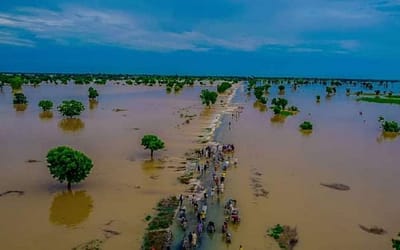Audu Bako Zoological garden is a 50-year-old garden which has been a hotspot for conserving millions of biological species. However, it’s rich biodiversity is currently undergoing drastic changes, evidenced by the lingering destruction of the biophysical structure of the zoo, landscape, and vast decline in biodiversity. It’s a sad reality that a beautiful historic site is disappearing right before our eyes.
The Audu Bako Zoological Garden is the second of its kind in Africa after Cote d’Ivoire, established by the late Alhaji Audu Bako, the then military governor of Kano State, Nigeria on the 13th of November 1972. Audu Bako Zoological Garden – Kano is located in Kano State, the commercial heart of Nigeria. It covers 46 hectares and has a collection of more than 60 species.
My visit to Audu Bako protected area was a dream come true moment, but it was also a sad moment and simultaneously a moment of joy. Audu Bako Zoo has been a site of relaxation for a lot of people around Kano, its neighboring provinces and other neighboring countries like Ghana, Niger Republic, Cameroon and Chad. “People from different parts of Nigeria and around the globe pay visit to this historic zoo either for recreational activities or for educational and research purposes” (Muhammad TK 2016). The visit had deep personal meaning for me – it was a recovery visit with my sick uncle who was diagnosed with laryngeal cancer. We thought of giving him a cheerful moment as he undertook his Chemo-Radiotherapy. At first sight he was excited “it was the best moment of my life” he said.

My uncle and his son, photo by Ibrahim Inusa
During our visit, I noticed that the zoo has fewer animals now. Lions, chimps, and elephants are just a few examples. Other animals are mostly found in groups of twos or threes, with the exception of monkeys, antelopes, and ostriches, which are also on the verge of extinction due to poor maintenance and inability for the government to bring in new species or replace the position of the dead ones.
Despite being a place for people to relax, there are a lot of empty cages with grass growing all over them. A staff member who showed us around the zoo stated that the number of animals in the zoo has decreased and that more animals are needed to attract visitors. “People have avoided the facility due to a lack of animals and inadequate care” he said. This is a setback for the future of Audu Bako Zoo, and that would jeopardize the integrity of the protected area. A local NGO that I work with (Nature Conservation Advocates for Climate Initiative) wrote again to the Audu Bako authority that the state of the zoo was inappropriate and that it needs thorough routine maintenance, the response was positive and that is the kind of feedback they want from local NGO like ours. They assure us that this letter would be attached to the letter the authority would write to the Kano State Government on the poor state of the protected area.
Upon departing Audu Bako zoo, I sat down and reflected on the things I saw; the good ones, the ugly ones, and, of course, the bad ones. Caring for animals is what I love doing, but seeing those species terribly battling to survive with poor hygiene kept me worried. Those animals have rights too, If you protect them, you need to feed them and care for them.
Three days after our visit to Audu Bako, my uncle passed away. He confirmed it was he best moment of his life, allowing him to experience a closeness to nature and wildlife he had never before experienced. Protected areas like the Audu Bako zoo matter – by preserving them, we preserve not only species, but the sense of wonder and connection that one can only experience by immersing ourselves in nature and interacting with the other species we share our beautiful planet with.
Below, I am sharing the steps I took to help protect Audu Bako, in the hope that they will provide some inspiration for you to support areas of importance in your local community:
- I joined ‘Global Youth Network for Biodiversity’ and wrote a letter to the Kano State Government on its effort to relocate Audu Bako zoo, putting pressure on the Government of Kano state to reconsider its intention to get rid of the protected area.
- My team and I at “Nature Conservation Advocates for Climate Initiative” developed a project to educate young people, particularly children, and to change their attitude towards nature.. “The NCACI Schools Eco-club project” aimed to change children’s and young people’s attitudes toward community restoration and wildlife conservation, as well as to increase their presence in the climate movement.
- I called on the government of Kano state to support zoo workers by providing them with modern equipment that would help them effectively care for and protect the local wildlife.




